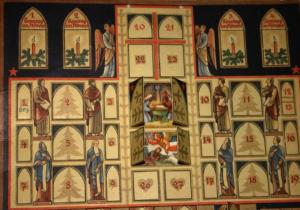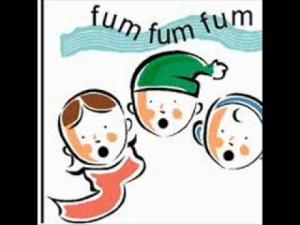
As the weeks of Advent get me looking toward Christmas, I think about how my family used this time to celebrate the story of Jesus. That story came alive with the help of an Advent Calendar and a Christmas crèche, with cow, sheep and shepherds, angels, magi, Mary and Joseph, and Jesus, and a star on top of the Christmas tree.
I remember how Marleen, I, and the children each night would open a door of the Advent Calendar. One door each day. We’d read the inscription, but not just the one behind that door. The story would get longer as we went through Advent because we would start from the beginning and read all the open doors every day. By the end we had the whole story practically by heart. It’s an unbelievable story and, I don’t think Matthew or Luke meant it to be believed literally.
Actually, it’s better as story than as unlikely history. If it’s history, it’s about some scientifically impossible events that happened once but don’t happen anymore. If it’s a story, it says what all of us want to believe about what the world is like deep down (and some of us really do). That belief and story challenge the made-up stories that enchant the world, in its modern, Western mode, a world that imagines it’s only living in reality. The Christmas story still enchants me. I hope this truer enchantment lives on in my grandchildren. It can disabuse them of the enchantments that govern much of our world.
Modern stories
I can think of four modern enchantments and corresponding stories. They are effective sources of meaning. In a world that tells stories merely for entertainment and distraction, these stories are much more than distractions.
- The Enlightenment story. It tells us to think for ourselves. Be unique individuals who make up our own ways of connecting to the world and each other. Make our own stories. It’s the myth of the rugged individual.
- The science story. Science gives us technology, making formerly impossible things possible and everything easier and faster. So we have the enchanting myth of progress. Progress seems to be a natural feature of reality, even though science itself knows nothing of such a value-laden thing.
- The capitalism story. We see how our economy creates wealth, even creating it ex nihilo, out of nothing except financial wizardry. It seems so magical that it entices with another improbable story about wealth trickling down by itself. A mythical “invisible hand” guides our individual selfish financial decisions toward the common good.
- The national story. We tell the story of a nation fashioned in creative violence by individuals joining together for a high purpose: equal rights for all. This social artifact gives us a new identity that competes with natural identities of kin, workplace, friendships, neighborhoods, and neighborhood church. The artificial identity grows steadily more powerful while many of the natural ones fade. Out of loyalty to our imagined national identity, we are willing to kill and die, believing in our noble story.
Advent Calendar stories, truer myths
There are many enchanting stories, and not all of them are good ones. Not all of them speak well of the truth. We need to tell good stories. We need truer myths. We’ll be enchanted one way or another. The Advent Calendar stories arrive in this context and challenge our four myths.
- Jesus is not a rugged individual in the Christmas stories. Like us, but unlike the way our Enlightenment myth projects us to ourselves, Jesus’ connections help make him what he is. Jesus is connected to family. The story in Luke begins with a cousin, Jesus’ forerunner, John the Baptist. Jesus is connected to tribe. Matthew imagines a scene with magi from afar, a slaughter of innocent babies, a hasty trip to Egypt and a return, all of which echo Jewish tribal history and hopes. Two different genealogies locate Jesus in time and space. One goes back to the Jews’ ancestor Abraham, and the other expands to the whole world by tracing Jesus back to the mythical first human.
- No one can think of inevitable progress through history while listening to either of these stories from Matthew and Luke. Their stories are full of amazing events interrupting life’s normal flow according to science’s or history’s laws. A virgin conceives. Angels appear, not to the top echelon of society but to lowly shepherds. Joseph violates convention and takes a pregnant woman into his home. Presumably wise people embark on a crazy journey after a star. A “son of God” (which happens also to be Caesar’s royal title) sleeps in a feeding trough. A precocious youth turns his back on career and fame and submits to humble parents for another 18 years. These hint at what will come later in the story and what may be possible for our world — not mere progress as the modern myth has it but something really new and, maybe, a healthy shock to the world’s expectations.
- In the gospels’ infancy stories the magic of gift replaces the false magic of self-interested monetary exchange. The magi present their gifts. The shepherds adore (“I give you my heart”). Even we in our celebrations make our attempts at gift-giving. Neither the magi nor the shepherds expect a return. The gifts are freely given. The baby Jesus has nothing to give back anyway, except a smile. But that exchange in Matthew’s and Luke’s introduction to their Gospels symbolizes the gift-giving character of all reality. Already we feel certain that the adult Jesus will play his part near the center of that reality as the story continues.
- There is killing and dying in the Advent Calendar stories. They expose the tragedy that empire imposes on history, then and now. Herod slaughters innocent children to preserve his rule. Simeon foresees a sword that will pierce Mary’s heart. Myrrh’s “bitter perfume” tells of Jesus’ end. The power for which others killed and still, imagining they are doing something noble, will crush him. But empire comes up short in this story as, we can hope, it always will. It was no glorious feat for empire to kill helpless infants or the non-violent Jesus. It was no triumph, either.
This is some of what I imagine is wrapped up in a simple Advent Calendar. It’s a story for our age, an age that, though it doesn’t know it, needs disenchantment as much as any other and re-enchantment more than most.
Image credit: Wikipedia via Google Images












